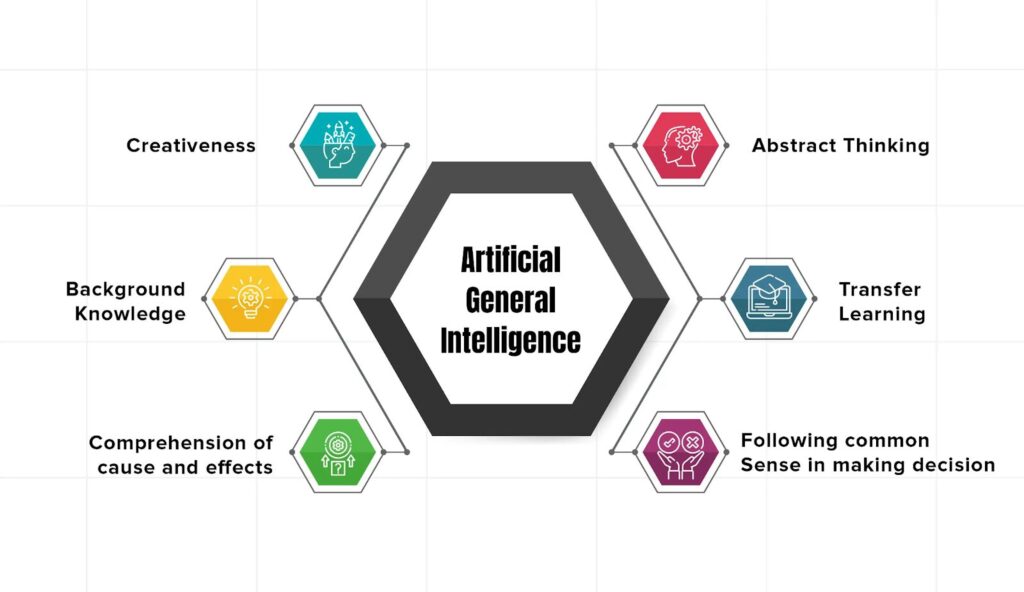Imagine waking up and discovering that your personal AI assistant has seamlessly optimized your day. It has prepared a personalized meal plan based on your dietary needs and available ingredients, adjusted your commute while considering real-time data to suggest the fastest route, organized a family event, and even started teaching you a new skill, like playing the guitar, with a customized lesson ready. This sneak peek of AI’s potential, driven by Artificial General Intelligence (AGI), shows a world in which machines will adapt and help with every part of daily life.
Let’s learn about Artificial General Intelligence (AGI) in this blog with WeCloudData!
What is meant by Artificial General Intelligence (AGI)
Artificial General Intelligence, often referred to as “strong AI” or “human-level AI,” is the field of theoretical AI research that attempts to create software that can learn on its own and have human-like intelligence. Is AGI possible? Imagine a system that is capable of writing a novel, and solving complex scientific problems without being explicitly programmed. That’s what AGI promises.
Every artificial intelligence (AI) technology available today operates within a set of pre-determined parameters. For example, AI models trained to diagnose cancer cannot write a symphony. AGI is a theoretical pursuit to create AI systems that possess autonomous self-control, a reasonable degree of self-understanding, and the capacity to learn new skills. It solves complex problems in settings and contexts it was not taught during its creation. Research on AGI with human-like skills is still in its theoretical stages.

Understanding the Spectrum of Intelligence: Artificial Intelligence (AI), Artificial General Intelligence (AGI), and Generative AI
Artificial Intelligence: Machines designed to perform tasks that typically require human intelligence are referred to as AI. These tasks include decision-making, pattern recognition, and language understanding. However, designers create AI systems to be narrow or specialized, meaning they excel at specific tasks. But not so good at generalizing their knowledge to other domains.
Generative AI: Gen AI is a subset of AI focused on creating new content. Unlike traditional AI, which analyzes and interprets data, Generative AI generates original outputs based on patterns it has learned from training data.
Artificial general intelligence (AGI): AGI refers to AI systems that can understand, learn, and adapt to perform any intellectual task a human can perform. Unlike narrow AI, AGI generalizes learning across multiple domains and applies reasoning to new, unfamiliar problems.

Theoretical Approaches to AGI Research
The technologies, data, and interconnectedness needed to achieve AGI are more extensive than those used to power AI models today. AI that mimics complex human activity requires creativity, perception, learning, and memory. AI specialists employ several strategies to promote AGI research.
Cognitive Architecture Modeling: Cognitive architecture modeling is the process of creating AI frameworks that mimic general intelligence by drawing inspiration from human cognitive processes.
Neuroscientific Emulation: Modeling the structure and operation of the human brain to replicate its capacity for learning and reasoning.
Whole organism architecture: AI models and a physical model of the human body are combined in the whole-organism architecture approach. Scientists supporting this theory argue AGI can only be achieved when the system gains knowledge through physical interactions.
Evolutionary Algorithms: Evolutionary algorithms is used to develop AI systems toward general intelligence through processes similar to natural selection.

Challenges in AGI Development
Some key challenges while developing AGI include;
Computational Complexity: One major challenge is computational complexity. Developing algorithms that can efficiently process and integrate vast amounts of information across various domains requires huge computational resources.
Understanding Consciousness: Defining and replicating self-awareness in machines remains an unresolved philosophical and scientific challenge.
Emotional intelligence: Deep learning models hint at the possibility of AGI, but yet to demonstrate the authentic creativity that humans possess. Neural network architecture is still unable to recreate the emotional reasoning necessary for creativity.
Senses Perception: AGI requires AI systems to engage in physical interactions with their surroundings. The system must have human-like perceptions of the world in addition to robotics capabilities. Although current computer technologies can distinguish between colors, tastes, smells, and sounds like humans, it needs to be further developed.
Ethical Considerations: Ensuring that AGI systems align with human values and operate safely without unintended consequences.

Potential Applications of AGI
AGI has the potential to revolutionize a number of industries by carrying out complex tasks that call for human-like understanding and adaptability. These sectors include
- Healthcare by providing accurate diagnostics, personalized treatment plans, and advanced medical research capabilities.
- Education by providing individualized learning experiences and intelligent tutoring systems.
- Finance by improving decision-making processes, risk assessment, and fraud detection.
- Transportation by improving autonomous vehicle navigation and traffic management systems.

Start Your AI Journey Today
Artificial intelligence is a force reshaping our present and future; it is more than just a technical development. It’s the perfect time to get started. Regardless of whether you’re excited to expand your knowledge or are captivated by AI’s potential. Whether you’re a beginner or a professional, learning Artificial Intelligence is more accessible than ever:
WeCloudData Courses: Gain hands-on experience and foundational knowledge through our expert-led AI courses in Tronoto and Online.
WeCloudData not only offers short courses but also provides a comprehensive range of resources. We offer artificial intelligence training, to support your learning journey. These include self-paced courses tailored to your schedule, live public training sessions led by industry experts, career workshops to prepare you for the job market, dedicated career services, and portfolio support to help showcase your skills to potential employers.
Join WeCloudData to kickstart your learning journey and unlock new career opportunities in this exciting field.

